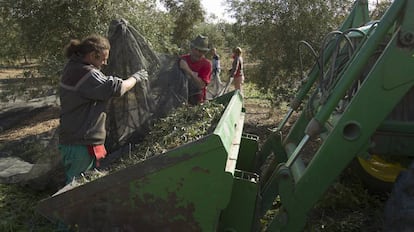After US unfair competition claim, Spanish olive sector prepares its defense
Trump administration is investigating Spain’s producers over doubts about price of exported fruit
Spanish producers of black olives are currently finalizing documentation that the United States has requested from them, as part of an investigation into unfair competition that was opened in July by the administration of Donald Trump. The sector must send detailed information on all its companies and the subsidies they receive before September 28. “They are 150-page questionnaires, an enormously complex, and laborious job,” complains the general secretary of the Spanish Association of Exporters and Industrialists of Table Olives (Asemesa), Antonio de Mora.

Following complaints filed by two Californian companies, the US Department of Commerce opened an investigation on the grounds that Spanish producers may be benefiting from unfair aid that allows them to sell below market price. The companies reject such accusations. Following the investigation, the Department of Commerce warned in July that tariffs would be imposed if these companies were found to be in violation of the rules. As detailed by De Mora, the US will issue a preliminary ruling on November 20 regarding the information sent on subsidies and on January 17 on an “anti-dumping” questionnaire. The final conclusions are expected next July.
Our main objective is to show that the US accusations are unfounded Antonio de Mora, representative for the sector
De Mora says that the documentation required by United States is an “absolutely thorough check, an audit of subsidies, costs, prices and the organizations themselves. [...] Our main objective is to show that the US accusations are unfounded, the subsidies are endorsed by the World Trade Organization. The sector does not receive any specific aid for olives or olive oil, it receives the same as any other product, meaning they are questioning the entire European system of subsidies,” De Mora argues.
“It should be made clear that the aid is not free nor done as a favor, they are subsidies that are awarded through tenders, which many other companies opt for, and must meet series of criteria and conditions for the investment,” adds a source for the Andalusian regional agriculture department. The documentation on the aid, De Mora points out, is being completed in conjunction with the Spanish government and the European Union. “A lot of the information must be supplied by them,” he explains.
Last year, Spanish producers exported 32m kilos of olives to the US, with a value of €70m
They must also send a “complete in-depth analysis” of each company by the September deadline. “In the anti-dumping questionnaire, each company must provide all the information regarding its costs, its productivity, its prices, its distribution...,” explains De Mora, who argues that the Spanish sector is a good competitor because its “companies are efficient, modern, world leaders, and do not exist as the result of any help.”
“Their prices are a consequence of their high efficiency. We are going to demonstrate that the difficulties the Californian companies are facing are not because of the imports,” he adds. Spanish producers exported 32 million kilograms of this type of olive to the US last year, with a value of €70 million and accounting for 36% of the total sold abroad, according to Asemesa data. In Spain, there are about 20 companies that grow this variety, although only 10 firms are responsible for 98% of the supply.
English version by Debora Almeida.
Tu suscripción se está usando en otro dispositivo
¿Quieres añadir otro usuario a tu suscripción?
Si continúas leyendo en este dispositivo, no se podrá leer en el otro.
FlechaTu suscripción se está usando en otro dispositivo y solo puedes acceder a EL PAÍS desde un dispositivo a la vez.
Si quieres compartir tu cuenta, cambia tu suscripción a la modalidad Premium, así podrás añadir otro usuario. Cada uno accederá con su propia cuenta de email, lo que os permitirá personalizar vuestra experiencia en EL PAÍS.
¿Tienes una suscripción de empresa? Accede aquí para contratar más cuentas.
En el caso de no saber quién está usando tu cuenta, te recomendamos cambiar tu contraseña aquí.
Si decides continuar compartiendo tu cuenta, este mensaje se mostrará en tu dispositivo y en el de la otra persona que está usando tu cuenta de forma indefinida, afectando a tu experiencia de lectura. Puedes consultar aquí los términos y condiciones de la suscripción digital.








































